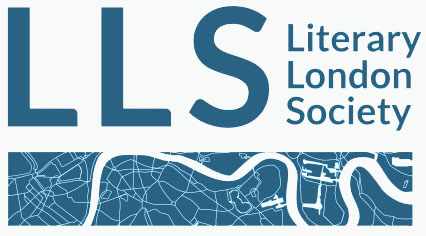Steven Barfield and Lisa Russ Spaar
‘Go where we may — rest where we will.
Eternal London haunts us still.’
Thomas More (1779-1852) from Rhymes on the Road
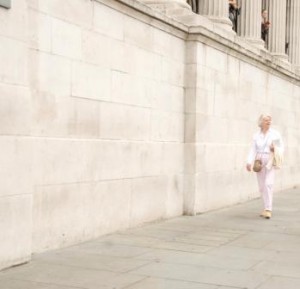
After I had interviewed Lisa Russ Spaar for a previous issue of Literary London about her anthology, All That Mighty Heart: London Poems, we had a slightly wild and whirling idea: what might happen if we asked a selection of poets who had written poems about London for their views on the city’s connection with their poetry? Many, but by no means all of the poets we asked, had originally contributed poems to Spaar’s anthology. As she says later in this article, we did not ask about what individual poems meant (which might have been considered rather cheeky!), but instead about what London meant to them as poets and their creative practice. While not every poet we asked responded, an extremely interesting and varied selection of poets did respond in a variety of ways.
I didn’t know quite what to expect from this project (which I admit was part of the fun), but I was greatly impressed by the generous spirit with which the poets responded to this off-beat request: though I imagine this was greatly facilitated by the fact that Spaar herself is one of their number, and knows what it is to struggle with putting London into verse. So we would like to begin by thanking profusely the following poets for their kindness and generosity in responding to our emails, for offering their considered thoughts and in several cases contributing their poems for this article: Al Alvarez; Talvikki Ansel; Amarjit Chandan; Stephen Cushman; Eamon Grennan; Sarah Laws; Herbert Lomas; Stephen Margulies; Carol Musk-Dukes; Anthony Rudolf; Ravi Shankar; Iain Sinclair; Briar Wood. The original photographs which accompany the article are by David Penny, who lectures in photography at Manchester Metropolitan University and they represent his response to the poets’ own thoughts. All images in this article here are copyright David Penny and we would like to thank David for giving us permission for their use in this article – any subsequent requests for reproduction should be addressed to him via his web site. His web site is at www.davidpenny.info. We would also like to thank the research administrator at Westminster University, Helena Scott, for compiling the interviews.
Although as I have said I didn’t know quite what to expect in terms of the result of the original email to the poets, I did have some definite ideas though about why it was worth asking them the question in the first place and it is this which forms my main discussion.First of all, London poetry, like contemporary poetry in general, is much less studied and researched than are novels and short stories about London. For instance, I suspect many readers of this journal could easily produce an ample armful of well-known post-colonial or ethnic London novelists, but would find themselves stretched to detail even a thin handful of the very many poets who share similar concerns and explore congruent themes about London as the prose writers. A quick scan of previous issues of Literary London suffices to bear out my contention that contemporary London poets are under-represented in terms of research and discussion as regards being part of London writing. In our interviews, poets such as Briar Wood and Talvikki Ansel respond as if instinctively to this question of what a postcolonial London means for the poet, while others such as Anthony Rudolf and Iain Sinclair consider history and the past’s relationship to the present. So I hope this article and the group interview it includes will highlight the multiple engagements of contemporary poets with London and lead to more study and research on the wealth of material available and indeed, to more attention in university and school syllabi to London’s current poets.
There is of course a long tradition of poetry about London, probably one that is as lengthy as London’s own history and while this article is necessarily focused on contemporary poets, insofar as it is based around interviews, I would hope that it still has something useful to say about poetry from the past and the continuing unresolved dialectic between the individual’s experience of the city and the making of memorable and precise lines about that often evanescent experience. Poetry is no different in one sense, from any other kind of representation of London experience and shares many of the same preoccupations, themes and intellectual contexts with other forms of literary and non-literary representation. Some might even claim that certain key themes and issues of literary London writing have originated with poetry rather than with the novel, to which they later transported.
For example, in the case of celebrated poets who have written about the alienation of the city, of London as unbroken nightmare, rather than as plentiful source of day-dreams, there is the modernist T.S.Eliot in The Waste Land or his Victorian, dystopian predecessor James Thomson in The City of Dreadful Night. In both cases their work has come to be regarded as representing a quintessentially poetic sensibility towards the city. However, that same experience of grudged and unforgiving alienation from city life is shared by diverse novelists such as Charles Dickens in Great Expectations and Our Mutual Friend, or more comically and parodically, by Samuel Beckett in Murphy. It is true, that in this brief sketch I am missing out much in the way of contexts and while something significant is being shared in terms of theme and setting; politically and socially speaking, Thomson is part of a tradition of left-wing socialist anti-urbanism, while Eliot’s ethos is rather more conservative. Both views though, undoubtedly stem from such earlier poetic accounts as Wordsworth’s famously haunting and disturbing vision in book VII of The Prelude, where the speaker becomes anonymized and spiritually lost in London’s crowded thoroughfares. In fact, London has always seemed a sepulchral and ‘unreal city’ to many writers, whether poets or novelists, for a complex array of reasons; however it is arguably the poets who have created the strongest and most passionately melancholic and disturbing images of this visionary and nightmare London.
Anne Janowitz argues in her outstanding essay on the category of sublime and London poetry that what was crucial for poetry was the feeling of sublimity used to figure and represent the expanding world city from the late eighteenth century onwards, despite the fact the sublime was originally a trope used to discuss untamed and non-human nature. Interestingly enough, Stephen Cushman suggests in his interview here and his somewhat arch and wittily Orphic lyric set on a London tube carriage, (and as Maurice Blanchot argued, the story of Orpheus and Eurydice can be seen as exemplary of the process of artistic creation), that the contemporary poet also links naturally between the city and the wild, if in Cushman’s case the greater wilderness of North America is the one he probably has in mind:
as I close my eyes to breathe in deeply
chamomile, lavender, rosemary, myrrh
from her shampoo, what more can earth do
for anyone traveling so far underground?
London became perceived as exemplary of the sublime for the Romantics for many reasons: it was growing geographically without seeming control; it was the hub of the country’s imperial commerce and trade with the external world; it had become the mixing board of extreme luxury and poverty; as well as the seeming victim and beneficiary of a spiralling population being sucked in to the vortex of the city from elsewhere. But, as Janowitz argues, it was the subsequent history of differing and ambivalent reactions by poets to what it meant to apprehend the metropolis as sublime, which would significantly determine not only Romantic poetry about London, but Victorian and modernist work as well. Lord Byron remarked of London that it was: ‘a mighty mass of brick and stone’. It is therefore good to see that Eamon Grennan chooses to reminds us of this once pervasively sublime feature of London, a trope still traced by the silhouette of a workman against the sky (as it is a long time since the clean air act gagged the smoking chimneys forever), in his poem presented here on the subject of a Victorian chimney in West Hampstead. Such views as those of Thompson, Dickens and Eliot represent a sense of the sublime city as inhuman negation, terror and deathliness, rather than the Kantian sense of creating the conditions for awe of and subsequent freedom of the self that we see in some of William Blake’s poetry about the metropolis (such as Jerusalem), or the later work of those who wanted to praise the city such as Symons, Levy and the Imagists. As Judith Walkowitz persuasively discusses in her book, City of Dreadful Delight: Narratives of Sexual Danger in late Victorian London (15-39), it is London’s cognitive ‘unintelligibility’ (an essential condition of the sublime for both Edmund Burke and Kant), which heightens the sense of both danger and the possibility of darker, more self-negating (or perhaps self-expanding) pleasures. Although I would argue this view of the city as a site of transgressive pleasure has endured from before the Victorian period and continues in various guises to this day, for example, in Martin Amis’ London Fields, or in rather more innocent and explicitly emancipatory form in the poems from the 1960s which Herbert Lomas offers here as his response to our question.
While Janowitz’ intricate and thoroughly convincing argument is too complex to do justice to in the space I have available here, it serves to powerfully remind us that the sublime city, (and the sublime has after all been a particularly significant category for poetry), has in turn become a means by which novelists and later literary critics came to grasp the city as an event in their experience. It is Blake’s view of the positive sublimity of the city in Jerusalem (‘London, a human awful wonder of God … human, mighty, sublime’) in which so much of this originates, as indeed one of our contemporary poet’s Stephen Margulies reminds us in his particular take on the history of poetic London. However, this view in turn is counterbalanced by that Wordsworthian view of the city as most sublime when it is most dead, least like its normal teeming and smoke-filled self, as in Wordsworth’s anthemic lyric, ‘Lines Composed Upon Westminster Bridge, September 3, 1802’.
Although, I am leaping through generations here and the work of significant figures discussed by Janowitz such as Charles Lamb, Joanna Baille, John Davidson, Richard La Galliene, Arthur Symons, Amy Levy and W.H. Auden, as well as others germane to the argument who are not discussed by her, such as the imagists T.E.Hulme and J.S.Flint; I think it can be reasonably argued that contemporary poets are to some extent still the ambivalent heirs of the sublime, working through and reworking a sense of London within that mode. Here the sublime, that powerful way of apprehending London and what it means to live in it, is figured more today by the city’s skyscrapers and multinational corporations and in its post-colonial and globalized excessiveness. London is no longer so much a world city as city of the world, its ties to Britishness at best loose and equivocal (thus Al Alvarez in his comments here, can quickly feel himself a Londoner first and an Englishman second), and as Spaar remarks later, the city is often grasped by contemporary poets in its and their ‘Otherness’, which is perhaps the obverse side of the sublime city. It is significant in this context that for poets such as Talvikki Ansel, London exists as an imaginary place which they have not visited in person, but which can easily exist virtually in representation because of its history and place in world culture, a suitable destination indeed for a re-imagined Caliban to go for a memorable visit.
Such sublime excessiveness exists not only in terms of the collapsing post-colonial geographies of the increasingly globalized present, but as Iain Sinclair discusses in his response, is just as true of the city’s pluralized pasts and the liminal relationship that exists between these pasts and our own revenant present: ‘Poets haunt the purlieus of the city in direct competition with developers, real-estate pirates. They practice the same black arts.’ Significantly it the ‘same black arts’ as shared by commerce and poetry, since both it can be argued are over-determined by London’s profoundly capitalist fabric. It is almost commonplace for critics of the relation of the urban to the representative arts to create a binary opposition between a ‘bad’ capitalist globalisation which is turning everything into a commodified and universal drab of sameness, as opposed to a ‘good’ non-capitalist, concrete localisation. But, in lived and concrete reality, cities like London have for a very long time existed as centres of international trade (long before significant industrialisation existed) as well as local industry, entrepots for commerce and immigrant and itinerant traders brought along rivers from the sea. Such trading cities as London have for these reasons often had aspects of a ‘cosmopolitan’ nature (in Kwame Appiah’s sense that to be cosmopolitan means to have a greater allegiance to being ‘a citizen of the cosmos’ [ixv], in the original Greek sense of the term, rather than an identity constructed around a single urban centre or city), because of the necessities of trade and commerce and the fluid sense of the urban boundaries with its other, that such networked financial relationships introduce. Sarah Laws in the prose poem she offers here, when compared to Sinclair, chooses a different, but no less uncannily historicised image of the London poet as ‘hermit’. The speaker of her prose poem is, ‘inhabiting the still centre: quiet mind within restless metropolises’. In a rather unusual strategy of female psychogeography intruding into the city’s body politic, and despite this often being considered a distinctly male form of contemporary writing, she goes on to suggest: ‘I write myself into the city’s veins; become a fracture welling grace’. Walking, listening or watching, as London activities figure prominently here in the interviews with those poets such as Eamon Grennan, Carol Muske-Dukes and Ravi Shankar, who are itinerant or occasional visitors of London, as after all, you don’t need to be a born a ‘native’ Londoner to observe, pace and write poems in the metropolis.
As my final example, there is much in common between the representation of the recent immigrants’ befuddlement and anxiety, the nostalgia for the land they have left/lost and the promises of the new city they live in. We can see such responses in canonical London novels such as Sam Selvon’s The Lonely Londoners or Salman Rushdie’s The Satanic Verses certainly, but such responses are if anything even more precisely and viscerally felt in the work of poets. Three examples from the free booklet London Poems on the Underground demonstrate this, as do the remarks in interview of the London based Punjabi poet, Amarjit Chandan. He reminds us of both the ambivalence and ambiguity towards the old culture that London often provokes for those who have emigrated here, in ‘self-imposed exile’ like Chandan, and the fact that not all poems written about London are necessarily written in English. Some like the work of poets of Caribbean descent in London, may be written in various versions of the non-standard English and Creoles of the islands (or ‘Nation language’ as Edward Kamau Brathwaite often referred to it as), or in what is now more properly thought of as a newer hybrid, Black British English. The narrator of Grace Nichols’ ‘Like A Beacon’ unexpectedly remarks: ‘I get this craving/for my mother’s food’. This leads in turn to a talismanic incantation of the local cuisine of the Caribbean, which at least for a West Indian reader conjures up in Proustian fashion, the sights, smells and tastes of being back ‘home’ in the West Indies:
I leave art galleries
in search of plantains
saltfish/sweet potatoes.
While in Moniza Alvi’s ‘Arrival 1946’, the speaker, Tariq, like a reverse image of a British explorer encountering the strange ways of ‘natives’ for the first time, marvels at the endless lines of washing hung out to dry between Liverpool and Euston and tries in his amazement to correlate this seeming incongruity with received ideas about the vastness and magnificence of Britain’s Empire. Finally, in Fleur Adcock’s ‘Immigrant’, the protagonist who has been in London eight months we are told, must explore their sense of identity and belonging by using a tongue-twister for those who speak foreign varieties of English:
secretly test my accent once again:
St. James’s Park; St. James’s Park; St James’s Park.
My second reason for beginning this project is that like many Londoners I’ve always loved the sudden revelatory surprises and the re-visitation of those poems that you had forgotten that is occasioned by Poems on the Underground; that intrepid enterprise to bring elegantly designed posters of poems from around the world to the mercilessly, packed-like-sardines tube travellers of London. Begun in 1986 by poets Judith Chernaik, Gerard Benson and Cicely Herbert, it is still producing exciting work after celebrating its twentieth anniversary a few years ago. Now much copied in other major cities around the world, it has actually achieved the previously unheard of feat of making an activity carried out by London Transport and its successor organisation, Transport for London, genuinely popular with London travellers. Poetry, it has often seemed to me, has a particular engagement with the phenomenology of London life for Londoners that has much in common with the reader’s experience of the Poems on the Underground, as we travel habitually, preoccupied with our own thoughts around the tube, poems suddenly beckon us out of and away from our being buried in a book or newspaper, as a kind estrangement from the city we live in. It is the combination of poetry’s rigorous preoccupations with structure and form punctuated by the sudden, aleatory and precisely imagined moment of an individual’s experience that the form struggles to match, alongside the determined wringing of transitory meanings from conditions of apparent randomness that gives much of it a distinctive quality when compared to prose about the city. Unlike the figure of the flâneur, the poets are always deeply involved in bringing care and attention to the everyday events they watch, hear and feel, the ‘daily bread of what happens’, as in Grennan’s description of a Victorian London house’s chimney in the poem he provides here:
built in the 19th Century. Such
odd shapes they have, these
funnels from which the smoke of
London twisted in clouds to be
the bile-green fog- soup—coal-
smoke mixed with viscous river-
fumes—staining the daily bread
of what happens
Could we imagine a series called Prose on the Underground, which could stand out successfully from the rag-bag of the usually unadventurous advertising ephemera of late capitalism in the railway carriages? It is perhaps unsurprising, in the light of this argument, that so many of the poets who chose to contribute to our group interview did so in the form of poems, or in poetic prose about their experiences as poets in the city, or by drawing on discussions of their own work as practitioners and their relationship to other London poets.
Uncannily enough, this process can also be seen working in anthologies of poetry about London, such as the aforementioned London: Poems on the Undergound, the free booklet that was distributed throughout London as part of Mayor Boris Johnson’s ‘Story of London 2009’ festival. In this short little anthology of just 25 poems, like many much longer anthologies, it is the odd juxtapositions, comparisons, and contrasts between poems from very different periods and traditions that become the norm, as the anthology flings them together like the Thames does with the city’s jetsam and flotsam. While this process is perhaps mundanely facilitated by the brevity of much poetry when compared to the novel, it nonetheless says something to me about the way poetry functions as kind of echo-chamber of London experience for its readers in all its depictions of the variety of this particular urban experiences; one which does not deprive us of the actual strangeness of living in the city filled with its and our history and dreams. Poetry I would venture to say, unlike the London novel and to coin a phrase originally used about William Blake, is always a kind of permanent ‘stranger from paradise’ haunting the experiential fabric of the metropolis, making us look again at what we take for granted about London’s life and how it has been seen over the years. This seems to me as a reader of poetry and literary critic, an aspect of poetry about London which I find most pronounced and enjoyable and I wondered, perhaps a little naively, if poets also saw the London they depicted in this way? However, this is something that I will leave the reader of this article to make up their own mind about.
Steven Barfield,
August 2009,
London
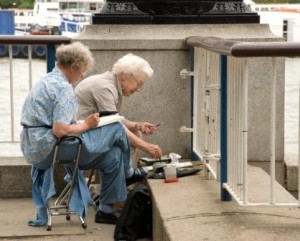
Backstories: A Poetics of London
Poetry is a broken language, words limning and turning against the nada of the margin and making imaginative forays into the terrain of the untranslatable, the ineffable, and the Other, fueled by an innate human desire to outer the inner across exquisite gaps of consciousness, culture, bodies, time, and space.
Little wonder, then, that poets are attracted to London –- manifold, palimpsestic, protean, and paradoxical – and chronicle its complexity with an intensity and fragmented luminosity (the fragment offering a small study of both the partial and the whole) rarely possible in prose. Interestingly, whether natives, transplants, visitors, exiles, immigrants, or vicarious armchair readers of the city, the poets gathered in All That Mighty Heart: London Poems all seem to require or acknowledge a sense of “otherness,” an experience of being an outsider that is perhaps essential to the poet’s project. And while each poem is an act of communication, providing a particular lens into the city, in fact poets themselves often make very unreliable interpreters of their own work. How fun, therefore, to ask a handful of poets, some from the London anthology and some not, to discuss not the meanings of their own London poems, but to riff about London the city and its relationship to their creative processes.
Several poets responded, not surprisingly, with poems –- Herbert Lomas sending in a poem originally published in 1974 evoking the National Gallery and the sexual revolution of the 1960s, Eamon Grennan a recent piece about a chimney mender in West Hampstead, Stephen Cushman a forthcoming lyric about the London Underground, and Briar Wood the Blakean “Cloudburst” (“At present,” writes Wood in an accompanying prose passage titled “Londonicity,” “I think of my poems in London as being like one-minute cell phone videos –- I try to catch in them the predominant sense of pulsing teeming life of all kinds I associate with the city”). London natives like Al Alvarez and Anthony Rudolf sent in rich bits about their respective engagements with the city as the descendants of immigrants; as Alvarez puts it, “[my] Spanish name and Jewish inheritance have always made me feel a bit of an outsider, as though, two centuries of residence and my British passport notwithstanding, I’m still not quite English. Or rather, I feel I’m a Londoner first, then an Englishman.” Others, like Ravi Shankar, write about London’s direct, vital influence on the work: “London entering my poems through its pores. Through other writers, like Amardeep Singh writing in his blog that ‘Ghangra songs claim London as if it’s a suburb of Jalandhar.’ Or Oscar Wilde, teaching Aesthetic values, quipping ‘that man who can dominate a London dinner-table can dominate the world.’ Else the Clash bringing from the underworld ‘the ring of that truncheon swing.’”
Talvikki Ansel, who has never been to London, imagines in “Pears and rue, I walk the London physic” what life would have been like for Caliban, “immigrant from the island’s sweet airs to the stink and practicalities of imagined London.” With moving, eloquence, immigrant Punjabi poet Amarjit Chandan, who thinks of the city as “a familiar stranger … unbearable at times,” writes that “London means a lot to me. I have spent half of my life here in self-exile, more than that I spent in my homeland. I have worked here making an honest living without fear. It is the birthplace of my son and grandson. I have loved and lost in this city … Deep in my solitude I came closer to my mother language. It has inspired many poems I scribbled on pieces of paper traveling in the Tube and walking the streets. A few of them have been translated into English, one being ‘The Peacock in Walpole Park, Ealing.’ That peacock is me.”
What can this meta-anthology of poetic backstories teach us about London, poetry, ourselves? Richard Sennett, In Flesh and Stone: The Body and the City in Western Civilization, offers one possibility: “Lurking in the civic problems of a multi-cultural city is the moral difficulty of arousing sympathy for those who are Other.” Poetry provides such a site – a place where diverse pain and loneliness and disaffection and suffering and chaos and even joy can be acknowledged and made sensible. In his prose poem “Memory is a Wound,” Iain Sinclair writes: “The brokering of secret spaces. Poets haunt the purlieus of the city in direct competition with developers, real-estate pirates. They practice the same black arts. They operate as franchised psychics, mediums tapping erased myths, fixing inverted commas around a previously innocent terminology: the room, the arch, the loft, the vault.” Sennett concurs: “Wholeness, oneness, coherence: these are key words in the vocabulary of power …. People who can acknowledge [instead the city’s] dissonance and incoherence in themselves understand rather than dominate the world in which they live.” Poetry and the paradoxically “broken” words of poets provide a way of discovering and creating just such a difficult and essential understanding. We can be grateful, as Sinclair puts it, that “Poet-walkers advance into the universal past. Nobody makes a charge for something that isn’t there. White ghosts in the trees on the hill. End of endlessness. The beginning of acceptable ignorance.”
Lisa Russ Spaar,
May 2009,
Charlottesville
Interviews with the Poets[1]
London: Al Alvarez
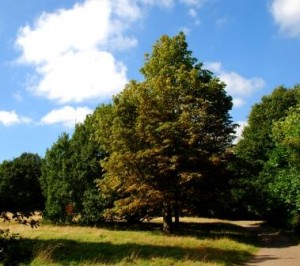
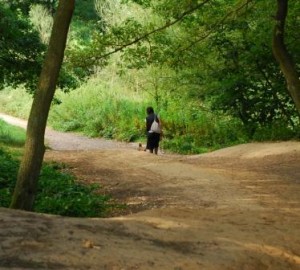
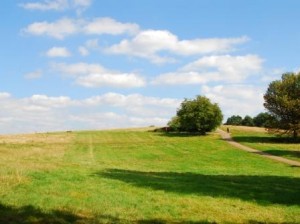
Despite my Spanish name, both branches of my family have been in London for generations since late in the 18th century at least, a hundred years or so after Cromwell allowed the Jews back into England. Even so, that Spanish name and Jewish inheritance have always made me feel a bit of an outsider, as though, two centuries residence and my British passport notwithstanding, I’m still not quite English. Or rather, I feel I’m a Londoner first, then an Englishman. London is where my fathers and mothers families have lived since they first arrived in England. I was born in Bloomsbury, my parents moved to Hampstead when I was about six months old, and apart from boarding school, Oxford, and a few extended stays in the States, Hampstead is where I have stayed ever since. London, I mean, is in my blood and Hampstead Heath, where I have walked and swam almost every day of my life, is the country of my heart.
Talvikki Ansel
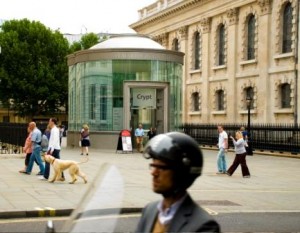
“Pears and rue, I walk the London physic” (this poem can be found in All That Mighty Heart: London Poems — eds.) is from a sequence in the voice of Caliban, immigrant from the island’s sweet airs to the stink and practicalities of imagined London. Where did London come from? I have never actually been there, and know enough to know my imagined London is as accidental as my idea of contemporary London: a scrap basket, a composting, an assemblage of assorted imagery and sensations. A host of plant species, old drawings from Culpepper’s herbal, recollection of a description of London from a small yellow paperback on Shakespeare’s times. For a transported Caliban in this poem, London means work, food, containment. For me, London was conjured up from stiff, gray-green cabbage leaves and green worms, and the traces of history in blooms that people have planted in their window boxes: accents of the plants’ colors and scents retained over centuries.
Amarjit Chandan: London my poetic muse
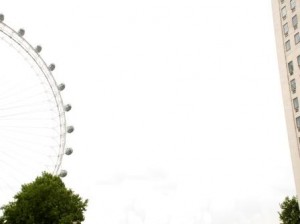
London means a lot to me. I have spent half of my life here in self-exile, more than that I spent in my homeland. I have worked here making an honest living without fear. It is the birthplace of my son and grandson. I have loved and lost in this city. I have marched on its streets in many a demonstration. Deep in my solitude I came closer to my mother language. It has inspired many poems I scribbled on pieces of paper travelling in the Tube and walking the streets. A few of them have been translated into English, one being The Peacock in Walpole Park Ealing (This poem can be found translated in All That Mighty Heart: London Poems — eds.) . That peacock is me.
My London is a small cave in a corner of planet earth. I have never been on the London Eye, but I wrote a poem imagining riding it even before it was formally opened to the public. The poem has imagery like this: Over there we sat on a bench wondering together. In that back garden a new flower blossomed on my family tree. Those roads there showed the way to me –- a lost outsider. There lies my murshid –- teacher -– awake in his perpetual dream. This refers to Marx.
It is hard to personify London, but its image lurks in the eye of my mind. When I address it in my poems, I think I talk to myself reminiscing past associations. After all these years I still find it a familiar stranger. Going by Samuel Johnson’s oft-quoted words I hope I will never be tired of London; though I find life here a bit unbearable some times.
How I have yearned this city could be mine
These roads
These rain-soaked lights
could hide me in their arms
and I could forget my past.
It is heartening to note that now Punjabis have started immersing their ashes in the Thames. With me, Punjabi, the language of my ancestors, will be dead for ever as my sons do not speak it. I can imagine it dissolving in the water flowing hurriedly towards the ocean.
Stephen Cushman
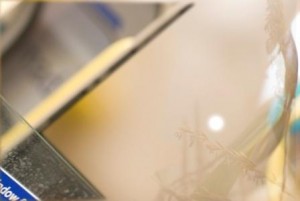
When it comes to the urban and its urbanity, I’m a bit of a bumpkin, having logged more hours in woods, on mountains, or beside an ocean than in any metropolis, though visits to cities throughout North American and Europe have always been exciting pleasures. In my first book of poems, only one is set in a city, and that poem focuses on the North American wolves in the London Zoo in the autumn of 1989, when I first lived in London. But in the second book, written after several extended stays in London over consecutive summers, the number of poems devoted to the textures of city-living became significant, and London has had its place in the books that have followed. Because London is the only city in which I have led something like a normal daily life, as opposed to the life of a tourist, I have to remind myself to try to distinguish what characterizes London in particular from what characterizes city-living in general. Most striking to me has been the simultaneity of unavoidable intimacy with and necessary distance from the people one passes or stands with all day long. Over the years the London Underground has generated many poems, one of which will appear in my next book:
Lower Window for Ventilation
When a shaft of wind blasts the car,
cooling the bodies that bump one another
better than practiced partners,
and blows the hair of someone unseen
standing packed in next to me
up like a scarf around my cheeks,
a few wild strands tickling my ears
as I close my eyes to breathe in deeply
chamomile, lavender, rosemary, myrrh
from her shampoo, what more can earth do
for anyone traveling so far underground?
Eamon Grennan
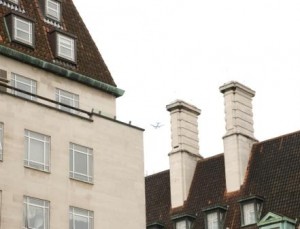
My sister has lived in London for years, and on my yearly visits back to Ireland from the States I’d very often stop over with her (a flat in West Hampstead). I loved the feel of the City, though. (And oddly enough when I started writing poems with any serious intent it was during a month-long stay there in 1977, so I guess the stimulus of the city worked its magic on me at that time too. I love the availability of so many things–to be able to take the underground and end up anywhere–at the theatre, a bookshop, a museum, an art gallery, a downtown pub I always look for when I go back, though I’m not sure it’s still there. The National gallery inspired an early poem, and I always pay a return visit. Walking by the Thames, over bridges and back, always prompts a little memory-making, thinking about the Elizabethan theatres, Bankside and all. Or sitting in Regents Park or St. James’s Park. Or walking up from West Hampstead to the Heath by the Keats house. So I’ve nothing very original or interesting to say about the place that hasn’t been said a hundred times before. But there’s something in the whole tone and flavour of those parts of the city that I’m more or less familiar with that I appreciate very much and willingly go back to. So much so that I can imagine spending a much longer time there, if circumstances allowed it. That the city is also a hub for departing for Europe is a pleasure in prospect, and its proximity to Ireland is a virtue, if that’s the word, that goes without saying (though in historical terms that proximity was a bit of a curse at times). I attach for your amusement a more recent piece with a London touch or two.
Paint This
The man standing against the sky of
a summer morning over West
Hampstead is mending a chimney
built in the 19th Century. Such
odd shapes they have, these
funnels from which the smoke of
London twisted in clouds to be
the bile-green fog- soup—coal-
smoke mixed with viscous river-
fumes—staining the daily bread
of what happens. Now, over
roofs and spires day-clouds puff
up to radiance, a heavenliness
Michelangelo might have
imagined, though the Dutch, the
English and the French taught
them to be terrestrial again—
while light as light remains
celestial, won’t be denied its high
descent, as that man standing by
the alien ungainly shapes of
chimneys won’t be denied his
own home-made human
silhouette against the huge
inhuman breadth of sky behind him.
Sarah Law
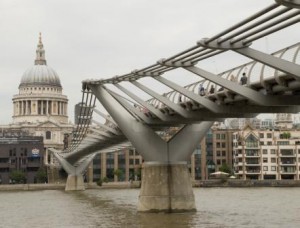
Traditional roles for hermits were often of the urban sort: manning a toll booth, guarding a bridge. Witnessing traffic from outer to inner, then back to the world again. Nevertheless the image of silence and withdrawal are apt, and here the London poet is in direct lineage, inhabiting the still centre: quiet mind within restless metropolis. I sit in my house as the night draws in, traffic like waves about a rock.
Walking over the Millennium Bridge, it’s always late summer. St Paul’s in the background, where my very breath evaporates, prayer a lost feather in sepulchral crevices. On towards Tate Modern, where you’re always waiting for me like a bright first date. And I’m carrying my notebook in my bag, white sheets bound tight, a hidden canvassing. I write myself into the city’s veins; become a fracture welling grace.
We’re buying a TV in an Oxford Street store: up several floors, a showroom of screens, each monitor mimics the others; talking heads, panel games and unmade beds –- all there in a foursquare patchwork. Snapshot devices, like a fly’s eyes. Just so a poet in this buzzing place, just so the echo of her poems. And look –- some folk wed on the wheeling London Eye, each oval pod a mobile everywhere, like a great hen’s egg.
Cityscapes cupped in the palm. So I give you my word.
Herbert Lomas
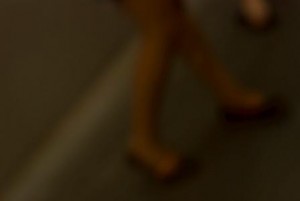
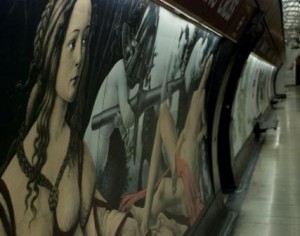
I’ve lived out of London for a long time, but perhaps the attached light poem, written when I was much younger and published in 1974 may amuse you and suggest the atmosphere of the sixties.
TWO POEMS ABOUT ART
1. In the National Gallery
I ‘m sitting in the National Gallery cafeteria
the tinned salmon sandwiches are a trifle expensive
and the intelligent well-brought-up
somewhat artistic girls come.
Particles of sexuality are
troubling the ether like lightwaves, or packets of energy,
and it’s very hot.
The quanta come off in clouds from between their legs
and gather round male trousers, insinuating themselves.
Later I might go up and look at the pictures.
2. Hot Day in the National Gallery after Sassoon
Everyone suddenly started taking their clothes off,
the ladies in hats and the girls in leather,
and one girl started scratching herself,
and when people started feeling each other
in front of the Rubens and Piero di Cosimos
the attendants were mute.
Nobody told the police, because of the spontaneity, the day
everyone impulsively fell in love in the National Gallery
and did everything artists had only dreamed about
as if they were all in celestial bodies on the Astral Plane
or bacchanaling around in the Elysian Fields,
with the sun shafting in through the dome,
catching water, making wine.
1969
From Private and Confidential, London Magazine Editions 1974
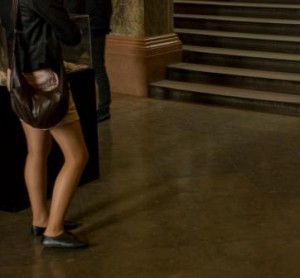
Stephen Margulies
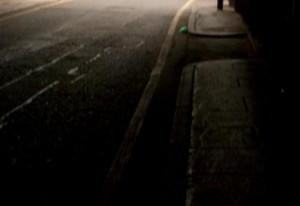
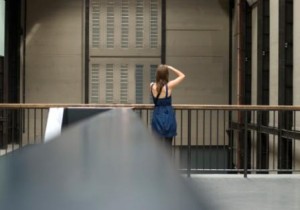
‘A Human Awful Wonder of God: London as Muse and Masochism’
It is both humiliating and exhilarating that I can’t rid myself of the glory and horror of London. As translator and artist — as a destitute Jewish poet born in Baltimore — London offers me degradation and inspiration. I don’t think I could survive without the defiantly lush or frankly crystalline words of Shakespeare, Keats, Blake, Dickens, Woolf and many other “human awful wonders of God,” as Blake might put it. Visual artists like William Blake, William Morris, D. G. Rossetti and Simeon Solomon or Mark Gertler are ecstatically anguished proof that the imagination can transmute Hell into Heaven — albeit at a perhaps lethal price, especially if one is not quite “English.” It is significant that London brought about the suicide of Mark Gertler and Amy Levy and turned the waywardly great Pre-Raphaelite artist Simeon Solomon into a homeless pariah. And yet London is therefore perhaps the most eminent example of Blakean contraries — its “dark Satanic mills” becoming Eden in the durably benevolent hallucinations of poets. London, as the first Titanically industrial city, was both the hardest harshest of realities and an incomparable inducement to visionary encounters, as one may feel in the work of Verlaine, Rimbaud and Cocteau. Simultaneously, Rimbaud saw “crystal boulevards” and “poor young families who shop at the fruit mongers.” Cocteau observed “certainly a curtain stirring / That hides the essential.” There is also the paradisal paradox that London is the grandest surviving remnant of Royal ostentation as well as one of the holiest birthplaces of democracy and socialism. London is the ultimate in Blake’s “human form divine,” the ancient Druidical yet swinging contemporary place where “twofold vision” or even “fourfold vision” is most at home. Blakean twofold vision is at least the victory of the imagination over the mechanical. Fourfold vision shows us that in her soul London may be the “the awakening to Eternal Life.”
Carol Muske-Dukes
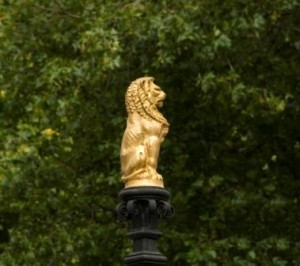
I had visited London often as a young writer-traveler and again, later, as the wife of an actor, seeing as many plays as one could manage but I had always felt that my heart was truly across the Channel in Paris (I had always heard that one either loved Brits or the French). I was a Francophile to be sure — but how could any poet not love London? Blake’s London, the Bard’s London, voices from the Tower, Dr. Johnson’s (and Samuel Pepys’) London, Virginia Woolf’s kaleidoscopic London … and on two particular visits to the city, one in 1987 and the other in the late 1990s, I saw a different London and learned to love it a new way.
In 1987 my daughter Annie was 4 years old, and we briefly re-located to London with my husband, the actor David Coleman Dukes, who had been engaged to appear in an ITV production of Eugene O’Neill’s Strange Interlude with Glenda Jackson and a then-unknown Kenneth Branagh — David was to play The Doctor to Glenda’s “Nina.” We (through the movie company) rented a flat in Cadogan Square, which was lovely, but stank of cigarette smoke (my daughter who was asthmatic could barely breathe) — so we moved to South Ken — and, for the next six or so months, lived as what were then called “Sloane Rangers.”
This trip afforded me a special glimpse into the actor’s London: the sound-stages, the nights out at the pubs (the over-the-top producer of Strange Interlude, for example, recently returned from Russia, hosting the cast and crew and all at The Elephant & Castle with pyramids of beluga brought from the Black Sea), the new Old Globe Theatre, conversations with Edward Petherbridge and Ken Branagh and his then-girlfriend Emma Thompson, Glenda Jackson’s fierce presence. And I was writing like mad — my first novel, Dear Digby — filling up yellow legal pads, even at the Greene Park near the Atheneum where we used to stay when Annie was younger and where she fed squirrels. While watching her play in Hyde Park, I wrote. In fact, I was a poet working on my first novel — attempting to write prose, and yet caught up in the day-to-day exigencies of actually living in London. During this time, Annie briefly attended a nursery school which included a “Windsor” (Prince Harry) in its population, hanging up her jacket (anorack) next to “Harry Windsor” and eating Shepherd’s Pie with the young prince. When we returned four months or so later to the U.S., I had finished my book and it was published by Viking/Penguin the next year. I will always associate London with that tentative first fiction experiment of mine.
And finally — when David was in the play “ART” at the Wyndham’s Theater in the West End in the late nineties, Annie and I joined him there for an extended visit. His co-stars were Stacy Keach and George Wendt, and it was a brilliant production. Once again, Annie played in David’s dressing-room and sat with me, watching the play unfold from backstage, from the wings, or in the front rows. And I wrote poems backstage and at the flat David had been given by the production company in Chelsea.
And London touched me in a whole new way, once again. There was night after night of theatre, the stalls — the cast from “RENT” which was just across the alley from David’s play at the Wyndham’s — wowing Annie (and me) yet again (we’d seen RENT, as we’d seen ART, in New York, L.A — but Annie proclaimed the London cast the very best) and best of all, watching David walk on-stage: our David had become, uniquely, our London.
Anthony Rudolf
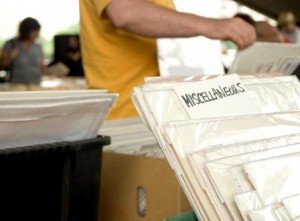
(i) from Scenes from Childhood by Anthony Rudolf
Perfect Happiness
I am ten years old. We have arrived at the house of my grandparents in Stoke Newington, 47 Manse Road, London N16, after driving here in our little Standard car from our own house, 41 Middleway, London NW11. It is Sunday afternoon. I run upstairs and kiss my grandparents, Josef Rudolf and Fanny Rudolf. As usual, my grandfather is wearing his suit. His watch is in the waistcoat pocket, at the end of a chain. My grandmother is dressed in black. She is large, not like my other grandmother. I smell chicken soup. I go downstairs and wander round the house. The house is tall and narrow. My grandfather works at home. He deals in second-hand clothes and army surplus. The ground floor is full of great coats and other items of men’s clothing. The basement is full of comics, published by my Uncle Leon Rudolf. One of them is called The Merrymaker. I like looking at the advertisements: toby jugs, packets of assorted stamps, magic charms. I go outside and throw my tennis ball against a wall. Where I live there are no walls like that. Here there are even shops close by! My grandfather speaks English with a funny accent. Sometimes he speaks Yiddish. He gives me sixpence. It is time to go home.
ii) from a section (‘The London Transcript’) of a work in progress about my grandfather Josef Rudolf. I tape recorded him in 1975 when he was in his mid-nineties. He is speaking.
In London, I been in the Jewish shelter in Mansell Street till one o’clock at night. My brother Jonas ran about till he found me sitting outside the shelter. I was sick of sleeping on the floor. I was two weeks on the floor sleeping in Hamburg, and on the ship third class was no joke. Jonas brought me from the shelter to his lodgings. He took all my clothes and threw them in the dustbin because he was afraid I was not clean from the boat. He gave me a shirt, and he told his wife Bertha, and she gave me three shirts and three vests and three pants.
I had lodgings in Lucas Street. In Jubilee Street. In East Mount Street, back of the London Hospital. In Jewish families. I’m orthodox. A brother in law and sister came to London to take me to America. I said I won’t go. I can exist in London just as well. I had got to know my future wife. My mother visited twice, for my wedding and my brother’s wedding, but my father wouldn’t come because it wasn’t froom [religious] enough here. She came for two weeks. I kept her for four weeks. She was anxious to go back and look after the younger children. My father had thirteen children to support, five from the first wife, eight from my mother. She went home out of pity for him, rachmonos: he was twenty years older. She was going to come again, but war broked out and nobody came no more from there. My parents died in their own beds, before Hitler came.
I had no trade. I met a man. For five pounds he said he would teach me to be a cutter and designer. Who will keep me for a month, I said? For that five pounds I could be in America not here. Still, I learned how to operate a trousers machine. I was paid in second hand clothes what I could sell. I sent home money to my parents. In them years you could start a big business with fifty pounds. As a machiner I earned three or four pounds a week.
I was learning to be a machiner in my brother’s workshop in Lucas Street. I started with ten shillings to pay my lodgings. Then I went out to work, in all sorts of places, and earned a pound, two pounds. Uncle Jonas paid my lodgings. Afterwards I paid him back. My brother-in-law Uncle Abba was my partner for 33 years in Lucas Street, and I lived in 16 Sutton Street.
I went past there once when I was working in your uncle Leon’s printing shop in Sun Street, three or four years ago. I was with Leon’s driver Alan and I smoked a cigarette and I was thinking what happened in them days. Before we was married, grandmother lived in 67 Chambers Street and then in Prescott Street. In the old days we went everywhere by bus. London Hospital to Marble Arch cost fourpence. Cheaper than the underground. When I was working by Leon, and we would need to go to the City, I used to say to Alan go through Chambers Street. He says to me something happened here that you won’t tell me. I said my girl lived here and I got married from this place.
Ravi Shankar
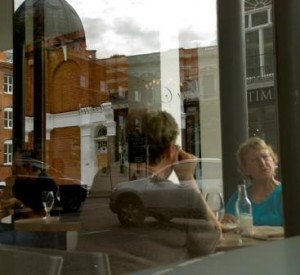
London was antipode to my Parisian experience as an undergraduate, though I didn’t live on Rue du Pot de Fer. I lived in the Latin Quarter in an international dorm, and when alone, tongue-tied and empty-pocketed outside a café or bar that had caught a sinus infection of nasal French, I longed for London.
Traveled there twice then. Once across the Channel from the white cliffs of Dover on a ferry. I stayed in Marble Arch for a week in a grimy flat with a mate’s mate, drinking pints of Fullers, buying a pair of ankle-high leather boots, listening to shoe-gazing and wahwah guitar, keeping my own Scullion’s Diary.
London entering my poems through its pores. Through other writers, like Amardeep Singh writing in his blog that Bhangra songs claim London as if it’s a suburb of Jalandhar. Or Oscar Wilde, teaching Aesthetic values, quipping the man who can dominate a London dinner-table can dominate the world. Else the Clash bringing from the underworld the ring of that truncheon swing.
Last year, best memory: walking along the South Bank in full sun, my friend Sudeep’s son whizzing around on a pair of blades, talking about Pascale Petit and Daljit Nagra while grandeur not penny gaffs are in view: Royal Festival Hall and the Southbank Centre with its dream of a Poetry Library, the iconic London Eye drawing eyes. Strolling across the Millennium footbridge, past the reconstructed Globe Theater and along Gabriel’s Wharf, the River Thames a constant and shimmering presence, folks everywhere sitting and in motion, reading and making love with that famous indigenous British subtlety, the entire world for an elongated moment, corrected. Civilized.
Iain Sinclair
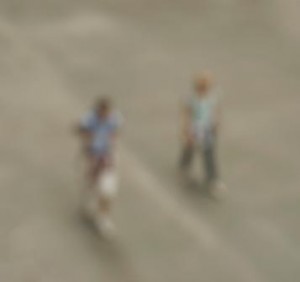
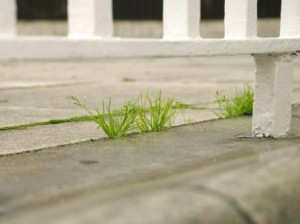
‘MEMORY IS A WOUND’
The brokering of secret spaces. Poets haunt the purlieus of the city in direct competition with developers, real-estate pirates. They practice the same black arts. They operate as franchised psychics, mediums tapping erased myths, fixing inverted commas around a previously innocent terminology: the room, the arch, the loft, the vault.
The story we had to tell is no longer required. Walks then, inspired by markings found on an abandoned map. Nicotine paper impregnated with the spirit of some disappeared scribe, his reluctant breath. He would compulsively pace up and down, or in circles, always clockwise. He had an obsessive conviction that he should put the whole world, and the heavens and angels, in his head, or in his heart.
The map becomes that heart; venturing into its channels, we are lost. We lose ourselves. False starts, misunderstood evidence. Poet-walkers advance into the universal past. Nobody makes a charge for something that isn’t there. White ghosts in the trees on the hill. End of endlessness. The beginning of acceptable ignorance.
Briar Wood
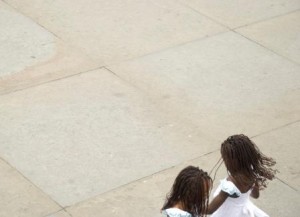
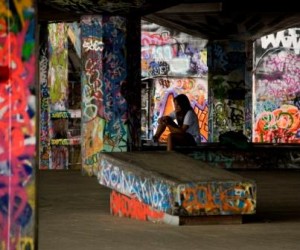
‘MEMORY IS A WOUND’
What I’ve always liked best about London is the mix of people, the sense of a place in a process of rapid change. Sometimes, in the middle of the flow, I look for sites that have a sense of stability and history about them. At present, I think of my poems in London as being like one minute cell phone videos –- I try to catch in them the predominant sense of pulsing teeming life of all kinds I associate with the city. I’m an atheist so it wasn’t any holiness about this site that appealed, but in difficult times it signified longevity and continuity as well as hopes for constructive changes that now may be possible in what is already the age of Obama.
Cloudburst
Tiger child, you take the future
in your stride, running wildly by
the riverside in full sun, sure
stepping under an August sky.
Such clouds that could make Turner rush
across the water – he’d have reached
out in hazy light for brushes
to paint this. Bleached barges beached
at low tide. Midsummer, midday
slows to still and silent, timeless –
history’s warp where memory strays
and stays out of the city’s stress.
A chorus girl line of angels
as the afternoon blurs golden
dazzle dancing in the maples.
Factories vacant now; this Eden
rent by contraries as it was in
the traitor poet’s time; not least
through fantasies that Catherine
foiled. William Blake was no priest.
Here William Curtis sampled
among the wide lavender fields
from gardens where you’ve trampled.
And yet among the river’s yields
a Celtic shield was found. Wielding stick
for sword, playing knight, my nephew,
fencing is your sport; getting quick
in word as well as nerve, will you
be a child of war or find peace?
Elsewhere, terror haunts the city –
the bombs went off and their release
brought shocked silence, anguish, pity.
At St Mary’s, Battersea, by
the river of regulations
and rules, they married, happily.
This wish for your generation –
our found boys and girls, no strangers
to each other or broad spectrums
reach, a talent to make changes
for all the new Jerusalems.
Endnotes
[1] We have left American and English spellings as in the original versions produced by each contributor. In the case of Anthony Rudolf’s transcription of his grandfather‘s memories, this has not been corrected for grammar nor spelling –- it is as Rudolf sent it to us.
Works Cited
Appiah, Kwame Anthony, Cosmopolitanism: Ethics in a World of Strangers (Penguin, 2006).
Benson, Gerard, Judith Chernaik, and Cicely Herbert (eds.), London: Poems on the Undergound (Poems on the Underground, 2009).
Blanchot, Maurice, ‘The Gaze of Orpheus’, in Maurice Blanchot, George Quasha (ed.), Lydia Davis (trans,), Paul Auster (trans.), Robert Lamberton (trans.), The Station Hill Blanchot Reader (Barrytown Limited, 1998), 437-442.
Janowitz, Anne, ‘The Artifactual Sublime: Making London Poetry’, in James Chandler and Kevin Gilmartin, (eds), Romantic Metropolis: the Urban Scene of British Culture, 1780-1840 (Cambridge University Press, 2005).
Russ Spaar, Lisa, All That Mighty Heart: London Poems (Virginia University Press, 2008).
Sennett, Richard, In Flesh and Stone: The Body and the City in Western Civilization, (W.W.Norton & Co, 1996).
Walkowitz, Judith, City of Dreadful Delight: Narratives of Sexual Danger in Late Victorian London, (Virago, 1992).
Biographies of Contributors
A. Alvarez (1929–), British poet, well known for both his creative and critical work, especially The Savage God: A Study of Suicide. Born in London, Alvarez served as poetry editor and critic for the Observer from 1955 to 1956. In 1961, he was awarded the Vachel Lindsay Prize for Poetry.
Talvikki Ansel (1962–), American poet, attended Indiana University for her M.F.A. and Stanford University as a Wallace Stegner fellow. Her first collection, My Shining Archipelago, in which one sequence imagines Shakespeare’s Caliban relocated to Elizabethan London, was selected for the 1996 Yale Younger Poets Award. Her second book of poems, Jetty, was published in 2003.
Amarjit Chandan (1946–), Punjabi poet, was born in Kenya and raised in India where he matriculated at the Panjab University; in 1980, he moved to London. Chandan has written eight collections of Punjabi poetry and served as editor of two British Punjabi anthologies. In 2002, he received the Shiromani Punjabi Bideshi Sahitkar award.
Stephen Cushman (1956–), American poet, is the author of three collections of poetry, most recently Heart Island, as well as two critical works and the forthcoming collection Riff Raff. Cushman is Robert C. Taylor Professor of English Literature at the University of Virginia; he has frequently led the University’s Summer Program Abroad in London.
Eamon Grennan (1941–), Irish poet. He published his first collection of poems, Wildly for Days, in 1983; since then, he has published regularly. In 1997, his translation of Giacomo Leopardi earned him a PEN Award for Poetry Translation. Grennan teaches at Vassar College in Poughkeepsie, New York.
Sarah Law British poet, studied literature at Cambridge and London universities, and is currently a Senior Lecturer in Creative Writing at London Metropolitan University, as well as an Associate Creating Writing Lecturer for the Open University. She has three poetry collections: two published by Stride (Bliss Tangle, 1999, The Lady Chapel, 2003) and Perihelion (Shearsman, 2006). A fourth collection is forthcoming in 2010, as well as a selection of poems in the major new Bloodaxe anthology Identity Parade.
Herbert Lomas (1924–), British poet and translator. In 1950, he began his teaching career, holding positions in Greece and Finland before becoming a lecturer at the West London Institute of Higher Education. His collection Letters in the Dark is based on his visits to Southwark Cathedral in London, and his translations of contemporary Finish poetry and prose have been widely lauded.
Stephen Margulies (1946 – ), American poet and artist, materialized in the stangest city, Baltimore, in the year when reality split open, 1945. He has degrees from Johns Hopkins University and the University of Virginia and has been a curator of Works on Paper at the University of Virginia Art Museum.
Carol Muske-Dukes (1945–), American poet and novelist, founded and co-directs the doctoral program in creative writing and literature at the University of Southern California. Her poems, represented in seven published books of poetry to date are contemplative and well-crafted, often using personal experience as a springboard into meditation, as in her most recent collection, Sparrow. Muske-Dukes’ many honors include the Alice Fay Di Castagnola Award and several Pushcart Prizes. She has also authored several novels.
Anthony Rudolf (1942–), British poet, translator, and editor, co-founded Menard Press which specializes in English translations and is located in London. Mandorla is his most recent collection of poems. He is also well known for his translations of Yves Bonnefoy’s poetry and was appointed Chevalier de l’Ordre des Arts et des Lettres in 2004.
Lisa Russ Spaar (1956 – ), American poet, is the author of several collections of poetry, most recently Satin Cash. She is the editor of All That Mighty Heart: London Poems and Acquainted with the Night: Insomnia Poems. Her awards include a 2009/2010 Guggenheim Fellowship and a Rona Jaffe Award for Emerging Women Poets, and her work appears in the Best American Poetry series. She is Professor of English at the University of Virginia.
Ravi Shankar (1975–), Indian-American poet, is the founding editor of the international online journal of the arts, Drunken Boat. He is Poet-in-Residence at Central Connecticut State University and is the author of a book of poems, Instrumentality (Cherry Grove). Shankar, a finalist for the 2005 Connecticut Book Awards, has appeared as a commentator on National Public Radio, published work in The Paris Review, McSweeney’s, and Poets & Writers, and is currently editing an anthology of contemporary Asian and Arab poetry, due out with W. W. Norton in Spring 2008.
Iain Sinclair (1943–), British poet, novelist, and filmmaker, studied at both Trinity College, Dublin, and at what is now the London Film School. Whatever the medium, Sinclair’s primary fascination has always been London, and works such as Lud Heat and White Chappell: Scarlet Tracings center around and incorporate London’s history. His London: City of Disappearances is an exciting “autobiography” of this shape-shifting city.
Briar Wood New Zealand poet and literary critic, grew up in Auckland, New Zealand, graduated from the University of Aukland and took her D.Phil at the University of Sussex. She is currently Senior Lecturer in Creative Writing and English Literature at London Metropolitan University. She has worked as a journalist and editor. Her poetry and critical writing has been widely published. Recently, she has written poems for the “Glorified Scales” installation by Maureen Lander at Te Papa Whakahiku/The Auckland War Memorial Museum and Shade House Poems, recording installation at Whangarei Art Museum with Maureen Lander and Robert Sullivan.
To Cite This Article:
Steven Barfield and Lisa Russ Spaar, ”Eternal London Haunts Us Still’: Thirteen Contemporary Poets Reflect on London as Muse’. Literary London: Interdisciplinary Studies in the Representation of London, Volume 7 Number 2 (September 2009). Online at http://www.literarylondon.org/london-journal/september2009/russ.html. Accessed on [date of access]
